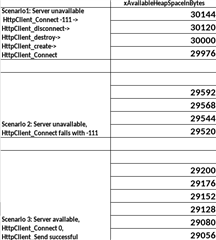Part Number: CC3135
Hi,
We are using the CC3135MOD module with STM32 with FreeRTOS. The module is interfaced through SPI. My application runs as an HTTPS Client and transmits data frequently, say every 10 seconds. I would like to know the ideal way to handle errors.
My pseudo code:
httpTask()
{
static int16_t retClientConnectStatus{-1};
static int16_t retClientSetHeaderStatus{-1};
static int16_t retClientSendStatus{-1};
static int16_t retClientCreateStatus{-1};
static int16_t retClientDestroyStatus{-1};
HTTPClient_extSecParams esParams;
char hostIpAddr[NO_23U_NUMERIC];
std::array<char, NO_62U_NUMERIC> requestURI;
requestURI.fill('\0');
if(retClientCreateStatus != 0)
{
HttpClient::httpClientHandle = HttpClient::CreateHttpClient(0, &retClientCreateStatus);
}
if(retClientCreateStatus >= 0)
{
if((retClientConnectStatus < 0))
{
esParams.clientCert = nullptr;
esParams.privateKey = nullptr;
esParams.rootCa = ROOT_CA_CERT;
retClientSetHeaderStatus = HttpClient::SetHeaderHttpClient(
HttpClient::httpClientHandle, HTTPClient_HFIELD_REQ_USER_AGENT, USER_AGENT,
strlen(USER_AGENT) + 1U, HTTPClient_HFIELD_PERSISTENT);
retClientSetHeaderStatus = HttpClient::SetHeaderHttpClient(
HttpClient::httpClientHandle, HTTPClient_HFIELD_REQ_CONNECTION,
CONNECTION_KEEP_ALIVE, strlen(CONNECTION_KEEP_ALIVE) + 1U,
HTTPClient_HFIELD_PERSISTENT);
retClientSetHeaderStatus = HttpClient::SetHeaderHttpClient(
HttpClient::httpClientHandle, HTTPClient_HFIELD_REQ_CONTENT_TYPE, CONTENT_TYPE,
strlen(CONTENT_TYPE) + 1U, HTTPClient_HFIELD_PERSISTENT);
static_cast<void>(memset(hostIpAddr, '\0', sizeof(hostIpAddr)));
static_cast<void>(strcpy(hostIpAddr, HOSTNAME));
retClientConnectStatus = HttpClient::ConnectHttpClient(HttpClient::httpClientHandle,
(hostIpAddr), &esParams, 0);
static_cast<void>(memset(hostIpAddr, '\0', sizeof(hostIpAddr)));
}
if(retClientConnectStatus == 0)
{
switch(msgType)
{
case wifiDataType::Msg_1:
std::copy_n(REQUEST_URI_Msg_1, strlenRequestURIMsg1, requestURI.begin());
break;
case wifiDataType::Msg_2:
std::copy_n(REQUEST_URI_Msg_2, strlenRequestURIMsg2, requestURI.begin());
break;
case wifiDataType::Msg_3
std::copy_n(REQUEST_URI_Msg_3, strlenRequestURIMsg3, requestURI.begin());
break;
default:
break;
}
std::copy_n(devName, FindMessageSize(devName),
requestURI.begin() + FindMessageSize(&requestURI[0]));
retClientSendStatus = HttpClient::SendHttpRequest(
HttpClient::httpClientHandle, HTTP_METHOD_POST, &requestURI[0],
reinterpret_cast<const char*>(msgToSend), (strlen(msgToSend) + 1U), 0);
}
if((retClientSendStatus < 0) &&
((retClientSendStatus != SL_RET_CODE_INVALID_INPUT) && (retClientSendStatus != SLNETERR_ESEC_HAND_SHAKE_TIMED_OUT)) && (retClientSendStatus != HTTPClient_ERESPONSEINVALID) )
{
retClientDestroyStatus = HttpClient::DestroyHttpClient(HttpClient::httpClientHandle);
static_cast<void>(memset(hostIpAddr, '\0', sizeof(hostIpAddr)));
retClientCreateStatus = -1;
retClientConnectStatus = -1;
}
}
httpTask gets called every 10 seconds.
My questions are:
1. Is the pseudo code correct?
2. What errors in HTTPClient_sendRequest or HTTPClient_connect should lead to HTTPClient_destroy and subsequent HTTPClient_create ?
I saw the HTTPSGET example in the SDK, where the client is destroyed after every send operation. I would not want to do that unless there is an error since I do not want the latency of the HTTP handshake every time I send.
Please advise.
Thanks,
SN


